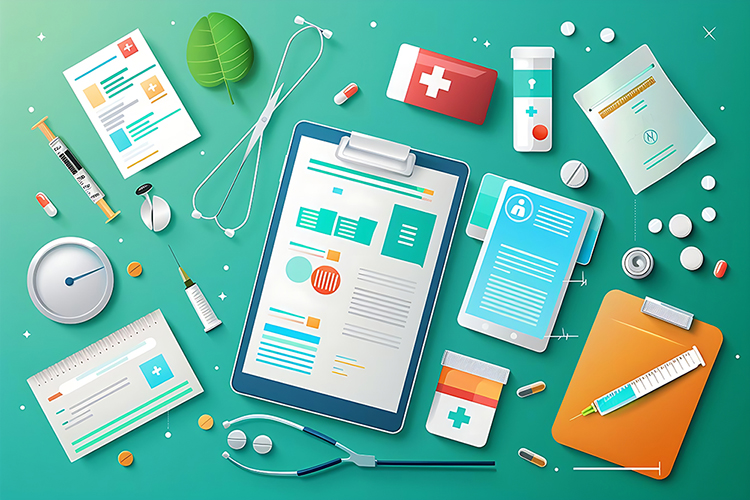What Kind of Labels Hold Up Best in Medical Environments?
This entry was posted on June 18, 2024 .
How the Medical Field Uses Custom Labels: Ensuring Durability in Healthcare Environments
Custom labels play a critical role in the medical field, ensuring that important information is clearly communicated and easily accessible.
These labels are used in various medical environments, including hospitals, emergency rooms, dental offices, and doctors' offices, to maintain organization, ensure patient safety, and comply with healthcare regulations.


Applications in Hospitals
In hospitals, custom medical labels are essential for a wide range of applications:
- Patient Identification: Medical labels are used on patient wristbands to ensure accurate identification and prevent errors.
- Medication Labels: These labels provide crucial information about medications, including dosage instructions and expiration dates.
- Equipment Labels: Labels on medical equipment help track maintenance schedules and ensure proper usage.
Uses in Dental Offices
Dental offices also rely on custom labels for various purposes:
- Sterilization Indicators: Labels on sterilization pouches indicate whether instruments have been properly sterilized.
- Patient Files: Medical chart labels help organize patient files and ensure that important information is easily accessible.
- Medication and Supply Labels: Labels on medication bottles and dental supplies ensure that items are used correctly and safely.
Labeling Needs in Doctors' Offices
In doctors' offices, custom labels help streamline operations and improve patient care:
- Appointment Reminders: Labels on appointment cards remind patients of upcoming visits.
- Prescription Labels: Custom labels on prescription bottles provide clear instructions for patients.
- Diagnostic Labels: Lab labels on test samples ensure accurate tracking and processing.
Key Features of Medical Labels
Durability and Strength
Determining the right number of labels to order is akin to finding the perfect recipe—it's about balance. For newcomers, starting with a conservative quantity allows for flexibility and iteration, adapting as your
Medical labels must be durable and strong to withstand the demanding conditions of healthcare environments. They need to adhere securely to various surfaces and remain intact despite handling, cleaning, and exposure to different temperatures.


Resistance to Chemicals and Moisture
Healthcare settings often involve exposure to chemicals and moisture. Medical labels need to be resistant to these elements to prevent damage and ensure that information remains legible.
This is particularly important for labels on medication bottles, sterilization pouches, and lab samples.
Readability and Compliance
Labels in the medical field must be easy to read and comply with healthcare regulations. Clear, legible text and the use of standardized formats help ensure that critical information is communicated effectively. Compliance with regulations, such as HIPAA, is essential to protect patient privacy and ensure accurate documentation.
Types of Custom Labels Used in Medical Settings
BOPP Plastic Label Material
BOPP (Biaxially Oriented Polypropylene) plastic is a popular choice for medical labels due to its durability and resistance to moisture and chemicals.
These labels are ideal for applications where long-term adhesion and legibility are required, such as on medication bottles and medical devices.
Temperature-Resistant Labels
Temperature-resistant labels are essential for items that need to be stored in extreme conditions, such as in freezers or autoclaves. These labels remain adhesive and legible despite exposure to high or low temperatures, ensuring that important information is always accessible.
Tamper-Evident Labels
Tamper-evident labels provide an additional layer of security by showing visible signs of tampering if someone attempts to remove or alter the label. These labels are crucial for medications and medical devices, helping to ensure the integrity and safety of products.
Best Practices for Using Custom Labels in Medical Environments
Ensuring Proper Adhesion
To ensure proper adhesion, it's important to clean and dry surfaces before applying labels. Press the label firmly to secure it, and allow sufficient time for the adhesive to bond with the surface. This practice helps prevent labels from peeling or falling off.
Regular Inspections and Maintenance
Regular inspections and maintenance of medical labels are essential to ensure they remain intact and legible. Replace any damaged or worn labels promptly to maintain accurate information and compliance with healthcare standards.
Compliance with Healthcare Regulations
Compliance with healthcare regulations is critical when using custom labels in medical environments. Ensure that labels meet all relevant standards and guidelines, such as those set by the FDA or HIPAA. This includes using appropriate formats, symbols, and information to protect patient privacy and ensure accuracy.
Wrapping Up
Choosing the right labels for medical environments is crucial for maintaining organization, ensuring patient safety, and complying with regulations.
Custom labels that are durable, resistant to chemicals and moisture, and easy to read are essential for hospitals, dental offices, and doctors' offices.
For high-quality custom medical labels, visit Lightning Labels. We offer a wide range of options to help you meet the demanding needs of medical environments.
FAQs: Labels in Medical Environments
What Makes BOPP Labels Ideal for Medical Use?
BOPP labels are ideal for medical use because they are durable, resistant to moisture and chemicals, and have a strong adhesive that ensures they stay in place. These properties make BOPP labels suitable for various medical applications, including labeling medication bottles, medical devices, and lab samples.
How Do Custom Labels Improve Safety in Medical Settings?
Custom labels improve safety in medical settings by providing clear and accurate information about patients, medications, and equipment. This helps prevent errors, ensures proper usage, and enhances overall patient care.
Can Custom Labels Be Used on All Medical Equipment?
Custom labels can be used on a wide range of medical equipment, but it is essential to choose the right type of label for each application. Factors to consider include the material, adhesive strength, and resistance to environmental conditions such as moisture and temperature.
What Are the Most Common Challenges with Medical Labels?
Common challenges with medical labels include ensuring proper adhesion to different surfaces, maintaining legibility over time, and complying with healthcare regulations. Regular inspections and using high-quality, durable labels can help address these challenges.

 Custom Labels
Custom Labels  Custom Beverage Labels
Custom Beverage Labels  Custom Lip Balm Labels
Custom Lip Balm Labels  Custom Warning & Safety Labels
Custom Warning & Safety Labels  Perfume Bottle Labels
Perfume Bottle Labels  Bumper Stickers
Bumper Stickers  Custom Prop 65 Warning Labels
Custom Prop 65 Warning Labels  Custom Stickers
Custom Stickers